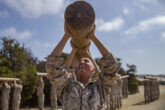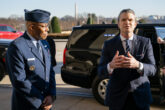July 22, 2020
Adapting the Image and Culture of Special Operations Forces
The Trump administration’s 2018 National Defense Strategy postured the U.S. military toward revisionist regimes such as China, Russia, Iran, and North Korea, all of whom are actively undermining the liberal world order. The Department of Defense has not explained what it expects irregular warfare to look like in coming years, and special operations forces today are still heavily engaged in counter-terror and counter-insurgency operations. “Special Operations Command must adapt to combatting nations that pose threats,” Gen. Richard D. Clarke, now its commander, acknowledged in confirmation hearings. As the command shifts away from violently kinetic raids against terrorists, it must adapt its image and culture to be more attractive to individuals with a broader array of skills to defend the United States in the uncertain future.
It is the people in special operations who ultimately make the difference between mission success and failure.
Considerable thought has been given to how special operations missions and force structure could and should adapt to competing against malign influence from nation-states, but such analysis often lacks a personnel perspective. While special operations forces are skilled in navigating ambiguity, to maintain their capability in the kill chain of future warfare, U.S. Special Operations Command must challenge itself beyond just adopting new technologies. More consideration must be given to the who in special operations, not just the what and the how. After all, the first of the “SOF Truths” — the five guiding imperatives of the special operations community — is, “Humans are more important than hardware.”
Read the full article in War on the Rocks.
More from CNAS
-
National Security Human Capital Program
Defending the Army’s Command Assessment ProgramThe concept for CAP — developed during the first Trump administration — benefited from the guidance, input and oversight from the foremost scholar and practitioner on military...
By Katherine L. Kuzminski
-
National Security Human Capital Program
‘Women Don’t Just Achieve…They Excel’: Fmr. Marine Corps Attack PilotDr. Kyleanne Hunter, former Marine Corps attack pilot and CEO of Iraq & Afghanistan Veterans of America, says “women are the fastest growing group of veterans” and “the fastes...
By Dr. Kyleanne Hunter
-
National Security Human Capital Program
Could the U.S. Bring Back the Draft?In this episode of At the Boundary, GNSI’s Dr. Guido Rossi sits down with Katherine Kuzminski, Director of Studies at the Center for a New American Security (CNAS), to explore...
By Katherine L. Kuzminski
-
National Security Human Capital Program
Hegseth Brings the Culture War to CombatThe fundamental challenge of military leadership lies in creating cohesive teams that can work together in an environment of mortal risk and, when called upon to do so, use le...
By Dr. Jason Dempsey




